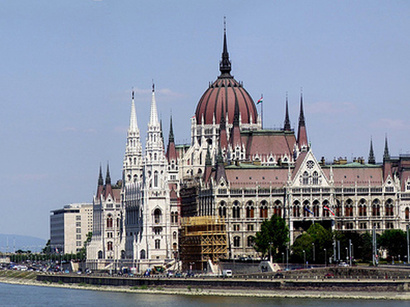Hungarian party issues statement on Khojaly genocide anniversary

Hungary's Jobbik party (For a Better Hungary), presented in the country's parliament with 46 and in the European Parliament with three mandates, issued a statement in connection with the 21st anniversary of the Khojaly genocide, the Azerbaijani Embassy in Hungary said on Tuesday.
"On February 26, 1992, the Armenian and Soviet militaries during a war of aggression launched in the name of fighting over the Nagorno-Karabakh Autonomous Region, captured and completely destroyed the Azerbaijani town of Khojaly, and massacred its inhabitants trying to escape. 613 civilians were killed, 150 people went missing," the statement said.
Armenian aggression which began in 1988 without a declaration of war, destroyed the lives of 20,000 Azerbaijanis, the statement said.
"Armed Armenians first expelled 250,000 Azerbaijanis from their native lands. These people had lived in the territory of Armenia for centuries and then, following the open military aggression and occupation, at least another 660,000 Azerbaijanis were expelled in the same way."
"This was an act of ruthless ethnic cleansing. Today Armenia continues to hold under occupation nearly one fifth of the territory of Azerbaijan," according to the document.
In order to resolve the conflict, the UN Security Council, the Council of Europe, the OSCE and the European Parliament have adopted relevant resolutions and appeals, the statement says.
'The solution of the conflict is always hindered by Armenian opposition. There could be no other purpose for the international community than restoration of the territorial integrity of Azerbaijan, termination of the Armenian military occupation and provision of the opportunity for the refugees to return to their homes," the statement says.
According to the document, in connection with the aforementioned, the Jobbik Party once again presents the proposal to the Parliament made previously on April 11, 2011, expanding the argument list through adding the countries that in the past two years issued a communiqué condemning the genocide committed in Khojaly.
"The Jobbik party in solidarity with the kindred Turanian peoples supports Azerbaijan's efforts towards restoring justice and conflict resolution in order to ensure a lasting peace," the statement read.
Expressing solidarity with the people of Azerbaijan, the party condemns the actions of the aggressor Armenia and demands implementation of the resolutions of the UN, OSCE, Council of Europe and other international organisations on the liberation of the occupied territories, restoration of Azerbaijan's sovereignty and territorial integrity and return of refugees to their homes.
The text of the statement is published on the party's website www.jobbik.hu and www.alfahir.hu, and disseminated among the members of parliament.
On Feb. 25-26 February, 1992, Armenian occupation forces together with the 366th infantry regiment of Soviet troops stationed in Khankendi (previously Stepanakert) committed an act of genocide towards the population of the Azerbaijani Khojaly town.
Some 613 people were killed including 63 children, 106 women and 70 old men. A total of 1000 civilians were disabled during the genocide. Eight families were killed, 130 children lost one parent and 25 lost both. Additionally, 1275 innocent residents were taken hostage, while the fate of 150 remains unknown.
The conflict between the two South Caucasus countries began in 1988 when Armenia made territorial claims against Azerbaijan. Armenian armed forces have occupied 20 per cent of Azerbaijan since 1992, including the Nagorno-Karabakh region and seven surrounding districts.
Azerbaijan and Armenia signed a ceasefire agreement in 1994.The co-chairs of the OSCE Minsk Group - Russia, France and the U.S. - are still holding yet unsuccessful peace negotiations.
Armenia has not yet implemented four U.N. Security Council resolutions on the liberation of Nagorno-Karabakh and the surrounding regions.
